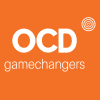-By Jenna Borrelli
Living with OCD has always been a technicolor experience for me. There are days in agony; days where I softly laugh at myself; days filled with empathy and connection. I pride myself in the work I’ve done to manage a lot of my symptoms and prioritize my healing. But just as we all know, and even though we try to, we can’t be fortune tellers when it comes to uncertainty. So when the pandemic hit and life was flipped upside down, I really felt like I was reinventing the wheel. That wheel was progress for me. And then I had to learn how to start fresh.
At the beginning, the impact of COVID felt like a loose myth. Before the first wave of shelter-in-place orders, I made a last minute and swift move: I left my life in Minnesota and moved back to Illinois to live with my family. I was really numb to the whole process, but it was a move for survival and mental health. I needed to be in an environment where I felt safe and had space to heal and process. So before the reality of COVID hit me, I was already learning how to transition out of an existing survival mode.
Despite the omnipresence of OCD in my life, I wasn’t really experiencing any major symptoms… yet. In fact it wasn’t until about two to three months into lockdown when I started to experience heavy doses of intrusive thoughts. I remember one morning I woke up with an intense bout of anxiety in what I call my “morning cyclers” (the pet name for my intrusive thoughts). I was experiencing extremely disturbing sexual thoughts that I simply couldn’t shut off no matter how hard I tried. I was in agonizing mental pain and absolutely exhausted. I reached out to a friend who I knew would often post about his experiences in the OCD community and basically said, “Please help me. I am stuck and scared.” And that one act, completely catapulted my life.
Through this friend I learned of myriad OCD resources. I attended sessions at the IOCDF’s virtual conference. I met other survivors on social media and started doing advocacy work together. I was inspired to write about my experiences with OCD and work with others in the same capacity. I started going to therapy again. And my favorite thing of all, I joined a weekly virtual peer support group.
The weekly support group became something very consistent and important to me. I cherish the hour I get to talk about anything, and I mean ANYTHING, regarding my experiences with mental health. In fact, this group of online strangers turned into my trusted community. These were some of the first people I came out to regarding some of the very insidious and dark intrusive thoughts I was experiencing. We laugh, we cry, and we heal together.
Finding my online community saved my life. That is not an exaggeration by any means. I am an incredibly social person who craves connection, and not being able to see as many people in person really took a toll on my mental health. Having folks who understand how debilitating it can be battling your own life, it’s truly something you do not take for granted. The online support I have received through my advocacy work, my writing, and my healing are all so special and impactful to me. Dealing with a very scary and exhausting global pandemic plus an all consuming mental disorder is not an easy feat. It can feel very isolating and dismal. But what I learned during COVID is if I get creative and become adaptable, I can still form incredibly meaningful connections. Feeling seen and heard is a life changing experience. And despite the world feeling dark and scary, I am so grateful for the people (in-person and virtually) who listen to my stories and share words of affirmations and encouragement.
During COVID, instead of getting worked up over what I can’t control, I remind myself that others are feeling the exact same way and I give myself grace. I accept my intrusive thoughts as thoughts. The acceptance piece isn’t always an easy feat, but the more I practice the better I feel I can actually implement it. With a new wave of restrictions and changes coming around the corner, I am ensuring I have a tool kit of resources in my back pocket. I am staying committed to my weekly OCD peer support group. I am attending virtual therapy sessions. I am working on communicating honestly with those I care about. And I am learning more and more every day that my voice and story matters; that my experiences are valid. My journey with OCD is not over, but the road to recovery is becoming more accessible, even when it feels like the world is shut down.

